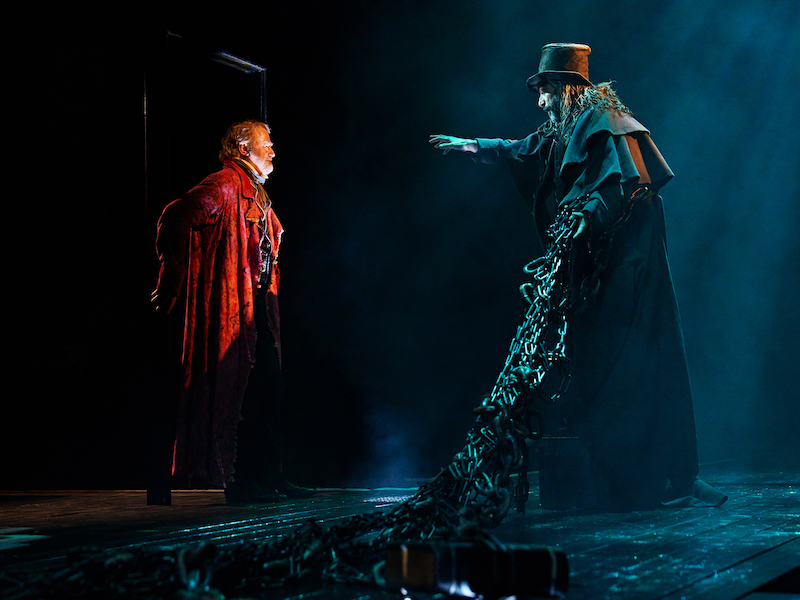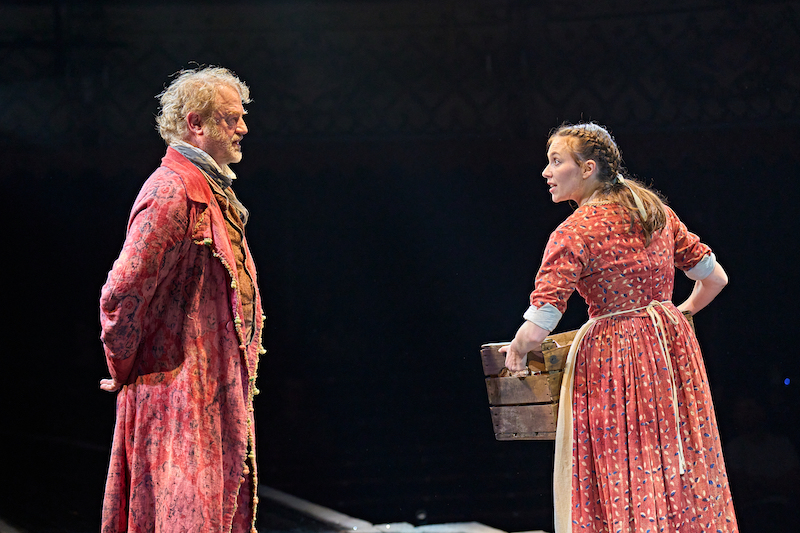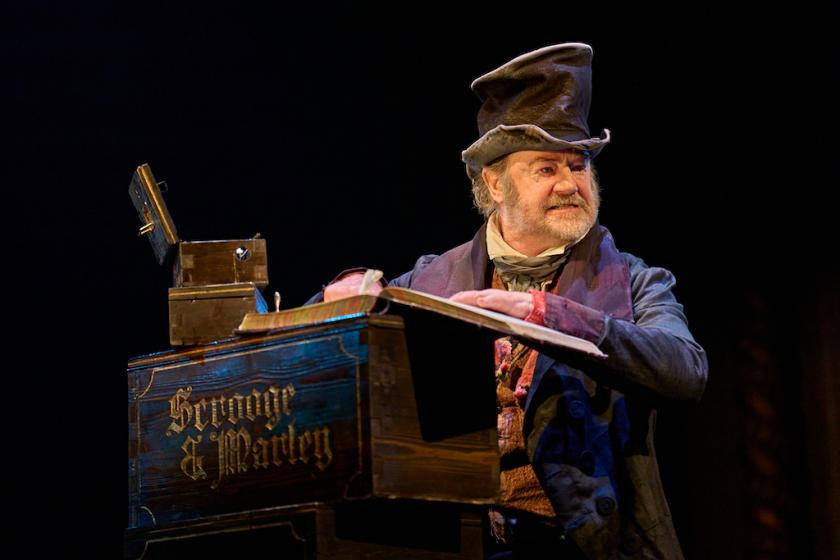It’s been five years since I saw the Old Vic’s first Christmas Carol, adapted by Jack Thorne and directed by Matthew Warchus, with Rhys Ifans in the lead. It’s since become an annual affair, with a different actor in the lead each year, even beaming – without an audience – from this stage during the pandemic. I’m chuffed, and not a bit surprised to see that it’s lost none of its power and delight.
In fact, the serious intent of the piece feels more relevant and necessary than ever. In 1843, Dickens wrote his story as a challenge to readers to exercise genuine charity to those less fortunate; in the shadow of today's cost of living crisis, the depiction of both poverty and the suffocating fear of debt is strikingly resonant.
This time it’s the turn of Owen Teale (pictured below, with Sebastien Torkia) to don the miser's mantle. He’s a canny, if perhaps counter-intuitive choice. The Welshman is best known for a sort of bitter villainy, not least as Ser Alliser Thorne in Game of Thrones, who led the murderous mutiny against Jon Snow at Castle Black; nothing in his CV suggests the mirth that we eventually require from Scrooge: all the better, then, given that the task of softening the moneylender should be believably daunting.
 The show’s basic ingredients appear much the same. The audience is wrapped around Rob Howell’s cruciform stage, whose long walkway allows for both dramatic entrances (Marley’s chains dragging across the whole length is quite a sight, especially if he’s clunking inches from your head) and spectacular stunts. The musicians are prominent above the action, and occasionally amongst it. Above them rests a beautiful canopy of lanterns.
The show’s basic ingredients appear much the same. The audience is wrapped around Rob Howell’s cruciform stage, whose long walkway allows for both dramatic entrances (Marley’s chains dragging across the whole length is quite a sight, especially if he’s clunking inches from your head) and spectacular stunts. The musicians are prominent above the action, and occasionally amongst it. Above them rests a beautiful canopy of lanterns.
The evening’s warm inclusivity is immediately established as the members of the ensemble – who multitask as chorus, dancers, and named characters – parade the stage dressed as town criers, greeting arrivals with mince pies, song and conversation. They also voice Dickens’ scene-setting opening, before Scrooge takes the stage.
The tall, well-built Teale, swirling around in a flowing red coat, is an unusually imposing, fierce Scrooge. When he dismisses the charity collectors as “the singing creatures”, he spits it out with such vehemence and bile that it’s surprising that they will later return for more. I still feel that Thorne rushes the early sections that establish both Scrooge’s humbug nature and the creepiness of the spiritual challenge ahead of him (there’s nothing macabre about Marley, which is a shame), but Teale leaves little doubt as to his character’s stubborn resistance to either charity or change.
In Teale’s forceful delivery, Scrooge’s mantra, “I will not be haunted", is a rejection not just of the spiritual intervention, but of the ghosts of his own misdeeds, a refusal to accept responsibility for his actions; perhaps it should be adopted at the Commons despatch box, the soundbite of any current government minister.
In any case, Scrooge’s painful re-education is where Thorne’s adaptation particularly excels. The Ghost of Christmas Past, in the diminutive form of an elderly northern woman, reminds him of “the bricks that built yer”, namely a tyrannical father who hid his penury, leaving his son with a pathological fear of debt and unhealthy reverence for wealth; the Ghost of Christmas present (younger, sharper, dark glasses and a snarl) imposes the notion of the moneylender’s own, moral debt; the Ghost of Christmas Future, in the inspired form of Ebenezer’s believed sister Fan, uncovers the cost of his belligerence to his own happiness.  Teale’s slightly squashed, puffy-eyed features perfectly suggest that cost, and the actor beautifully essays Scrooge’s transition from the night to the dawn, from scowls to smiles and the readiness for redemption. It’s incredibly moving when he calls on his lost love, Belle (the impressive Lydia White, pictured above with Teale), now contrite and tender; this is another Thorne twist, all the more effective in the way it avoids easy sentimentality.
Teale’s slightly squashed, puffy-eyed features perfectly suggest that cost, and the actor beautifully essays Scrooge’s transition from the night to the dawn, from scowls to smiles and the readiness for redemption. It’s incredibly moving when he calls on his lost love, Belle (the impressive Lydia White, pictured above with Teale), now contrite and tender; this is another Thorne twist, all the more effective in the way it avoids easy sentimentality.
Warchus’s direction has been cosily inventive throughout (aided by some wondrous lighting by Hugh Vanstone) but he really goes to town for the spectacular finale – Scrooge’s friendly raid on the Crachit Christmas – which involves heavy snowfall, the aerial delivery of fruit and veg and Teale somehow not getting his head knocked off when ducking beneath a giant turkey that flies across the stage. As the ensemble deliver a final carol, with bells, the feelgood factor has been well and truly earned.















Add comment